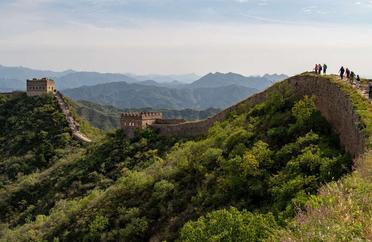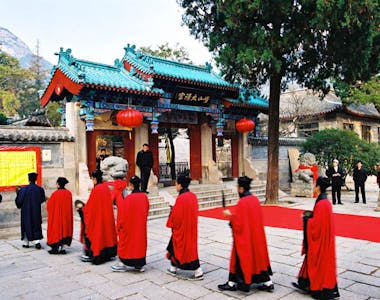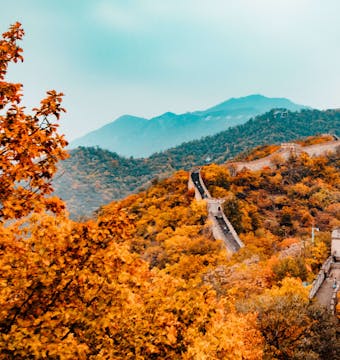Walk The Great Wall of China
Explore One of The Wonders of The World
Popular tours
- Save1%
 View Tour
View TourWalking the Great Wall of China - 8 Days
- Beijing to Beijing
- Age group: 15 - 99
- Max group size: 12
Was:£995From£985 - Save1%
 View Tour
View TourWalk the Great Wall of China 2026 - 10 Days
- Beijing to Beijing
- Age group: 16 - 79
- Max group size: 16
Was:£1,425From£1,411 - Save1%
 View Tour
View TourWalk the Great Wall of China 2027 - 10 Days
- Beijing to Beijing
- Age group: 16 - 79
- Max group size: 16
Was:£1,495From£1,480 - Save16%
 View Tour
View TourChina & Vietnam: The Great Wall to Ho Chi Minh - 28 Days
- Beijing to Ho Chi Minh City
- Age group: 12 - 100
- Max group size: 16
Was:£3,679From£3,096  View Tour
View TourEpic China From Great Wall to Shanghai - 9 Days
- Beijing to Shanghai
- Age group: 0 - 100
- Max group size: 65
From£2,202 View Tour
View TourSignature: China from the Great Wall to Shangri-La - 19 Days
- Beijing to Shanghai
- Age group: 12 - 100
- Max group size: 22
From£12,949
Walk The Great Wall of China
Discover the Magnificence of the Great Wall of China on Unforgettable China Tours and Holidays
Embark on an extraordinary journey to China, a land of captivating wonders and ancient treasures. One of the country's most iconic and awe-inspiring landmarks, the Great Wall of China, awaits your exploration. As you traverse its ancient stones, you'll be transported through time, immersing yourself in the grandeur of this UNESCO World Heritage site. Get ready to embark on an adventure that will leave you in awe.
Stretching over 13,000 miles, the Great Wall weaves its way through rugged landscapes, traversing mountains, valleys, and meandering along the picturesque countryside. This monumental feat of engineering dates back centuries, reflecting China's rich history and the indomitable spirit of its people. A true testament to human ingenuity and determination, the Great Wall stands as an enduring symbol of China's grandeur.
As you set foot on this architectural marvel, be prepared to be enchanted by its majestic beauty and panoramic vistas. The Great Wall offers a myriad of sections to explore, each with its own unique charm and allure. From the well-preserved sections near Beijing, such as Badaling and Mutianyu, to the more rugged and less crowded sections like Jinshanling and Jiankou, there's a Great Wall experience to suit every traveler's preference.
As you ascend the ancient steps and walk along the winding pathways, you'll be rewarded with breathtaking views of rolling hills, verdant forests, and the sprawling countryside. Stand atop watchtowers, their weathered stones whispering tales of battles fought and empires defended. Imagine the soldiers who once patrolled these very walls, guarding against invaders and protecting the realm.
Beyond its historical significance, the Great Wall offers a myriad of activities for adventurous souls. Hike along the undulating terrain, capturing awe-inspiring photographs along the way. Marvel at the dramatic sunrises or sunsets that paint the sky with a kaleidoscope of colors. Or perhaps embark on a thrilling toboggan ride down certain sections, an experience that will bring out the childlike joy in all ages.
A journey to the Great Wall of China is not merely a visit to a landmark; it's an immersive experience that unveils the layers of China's storied past. Combined with the country's rich culture, delectable cuisine, and warm hospitality, a trip to China promises an unforgettable adventure for explorers of all ages.
Join us on our carefully crafted China tours and holidays, where we delve into the wonders of the Great Wall and take you on an enchanting exploration of this captivating country. Uncover the mysteries of the past, immerse yourself in vibrant traditions, and create memories that will last a lifetime. Let the Great Wall be your gateway to a world where ancient legends come alive and modern marvels await at every turn.
Book your China tour or holiday today and embark on an extraordinary journey that will leave an indelible mark on your soul. Discover the allure of the Great Wall of China and experience the wonders of this remarkable destination firsthand.
How far is a typical walking tour?
The distance covered during a typical walking tour of the Great Wall of China can vary depending on the section you choose to visit and your personal preferences. Some sections, such as Badaling or Mutianyu, are well-preserved and more tourist-friendly, offering easier walking conditions and facilities. These sections are often preferred by visitors who are looking for a more leisurely stroll and picturesque views. On these sections, a typical walking tour might cover around 2 to 5 kilometers (1.2 to 3 miles).
On the other hand, if you opt for less crowded and more challenging sections like Jinshanling or Jiankou, the walking distance can be longer. These sections often provide a more authentic and rugged experience, with steep inclines, uneven steps, and less-developed infrastructure. A typical walking tour on these sections might cover 5 to 10 kilometers (3 to 6 miles) or more, depending on the specific route and your pace.
It's important to consider your fitness level and the amount of time you have available when choosing a section and planning your walking tour. Keep in mind that walking the entire length of the Great Wall is not feasible for most visitors, as it stretches for thousands of miles. Therefore, it's recommended to focus on specific sections that align with your interests and capabilities.
Additionally, it's worth noting that there are options to hike only a portion of a section or to explore multiple sections over several days. Some visitors choose to hike from one section to another, combining different experiences and distances. These multi-day hiking adventures can range from shorter treks to more extensive journeys.
When participating in a guided walking tour, your tour operator will typically provide information about the distance and difficulty level of the route. They can also offer insights into the historical significance and points of interest along the way.
Remember to wear comfortable footwear, dress appropriately for the weather, and carry water and snacks during your walking tour. Take breaks when needed and allow plenty of time to soak in the awe-inspiring views and immerse yourself in the Great Wall's magnificent surroundings.
When is the best time to visit The Great Wall of China?
The best time to visit the Great Wall of China largely depends on your personal preferences and the experience you're seeking. China experiences distinct seasons, each offering its own advantages and considerations for visiting the Great Wall. Here's a breakdown of the seasons:
Spring (March to May): Spring can be an excellent time to visit the Great Wall, especially in April and May when the weather is mild and flowers bloom. The landscapes are vibrant, and the crowds are relatively smaller compared to peak tourist seasons. However, be prepared for occasional rain showers during this time.
Summer (June to August): Summer brings warm temperatures and longer daylight hours, making it a popular time to visit. The lush greenery surrounding the Great Wall is at its peak during this season. However, keep in mind that summer is the peak tourist season, and popular sections of the wall can get crowded. It's advisable to visit early in the morning to beat the crowds and avoid the hottest part of the day.
Autumn (September to November): Autumn is considered one of the best times to visit the Great Wall. The weather is generally pleasant with mild temperatures, clear skies, and stunning fall foliage, especially in October. The tourist crowds start to diminish, allowing for a more serene and enjoyable experience.
Winter (December to February): Winter brings colder temperatures, occasional snowfall, and fewer tourists. If you don't mind the chilly weather, visiting the Great Wall during winter can be a unique and serene experience. The snow-capped scenery can be quite picturesque, and you'll have a chance to explore the wall with fewer crowds. It's important to dress warmly and be prepared for potentially icy conditions.
It's worth noting that weather patterns can vary across different sections of the Great Wall due to the vast geographical span. Sections closer to Beijing, such as Badaling and Mutianyu, may experience more extreme weather conditions and larger crowds compared to more remote sections like Jinshanling or Huanghuacheng.
Ultimately, the best time to visit the Great Wall of China depends on your personal preferences for weather, crowd levels, and the overall experience you desire. Consider your priorities and plan accordingly to make the most of your visit to this magnificent UNESCO World Heritage site.
Do I Need Any Equipment?
If you're on one of our trekking trips along the great wall you may need some gear but it is just the basics. For example you're going to need some good walking boots, a water bottle, a hat, sun glasses, suncream, a camera, water proof day pack etc...You don't require anything specific in terms of gear. For further detail you'll find a packing list in our brochures which you can download from the tour page.
What Happens With Luggage?
You only need to carry your day pack with the essentials for trekking during the day. The porters are responsible for the rest of your luggage. There are strict rules about how much they can carry and this will all be explained before the trip. Many people go on for a well-deserved rest at the beach after the trek or carry on travelling, so you can leave the rest of your luggage at the starting hotel.
Will I need a visa to travel to China?
Yes, most travelers visiting China will require a visa. China has specific visa requirements based on the purpose and duration of your visit, as well as your nationality. It is essential to check the visa regulations for your country of citizenship well in advance of your travel dates.
Generally, visitors to China need to obtain a tourist visa (L visa) unless they are eligible for visa-free entry under specific agreements. The L visa allows for leisure and tourism activities, such as sightseeing, visiting friends and family, or participating in cultural exchanges.
To apply for a Chinese tourist visa, you typically need the following documents:
- Valid passport: Your passport should have at least six months of validity remaining and blank visa pages.
- Completed visa application form: You will need to fill out the application form accurately and truthfully.
- Passport-sized photos: Recent, color photos that meet the specific requirements.
- Proof of travel: This includes flight itineraries, hotel reservations, or an invitation letter from a host in China.
- Financial documentation: Some consulates may require proof of sufficient funds to cover your expenses during your stay.
It's important to note that the visa application process and requirements can vary depending on the country where you submit your application. It is advisable to contact the nearest Chinese embassy or consulate in your home country or visit their official website to obtain the most up-to-date and accurate information regarding visa application procedures.
It's recommended to apply for a Chinese visa well in advance of your intended travel dates to allow sufficient time for processing. Planning and obtaining the necessary visa will ensure a smooth and hassle-free journey to China.
What is the local currency in China, and can I use credit cards?
The local currency in China is the Chinese Yuan (CNY), also referred to as Renminbi (RMB). When traveling in China, it is advisable to carry some cash in local currency for smaller establishments, street vendors, and places that may not accept credit cards.
Credit cards, particularly major international ones like Visa and Mastercard, are generally accepted in larger hotels, restaurants, and retail stores in major cities and tourist areas. However, it's important to note that acceptance may vary, especially in smaller towns or rural areas. Additionally, while credit cards are increasingly accepted, cash is still widely used in many establishments.
To ensure you have access to funds during your trip, it's recommended to carry a mix of cash and a credit card. You can exchange foreign currency for Chinese Yuan at airports, banks, or authorized currency exchange outlets. It's advisable to exchange currency at reputable places to ensure fair rates and avoid counterfeit bills.
It's also worth noting that some ATMs in China accept international debit and credit cards, allowing you to withdraw cash in local currency. However, it's essential to inform your bank or card issuer about your travel plans to avoid any issues with your card's usability abroad.
Traveler's checks are not widely accepted in China, so it's best to rely on cash and cards for your financial needs. Always keep your cash and cards secure, and consider splitting them between different locations or using a money belt for added safety.
Before traveling to China, it's recommended to check with your bank or card issuer regarding any international transaction fees, currency conversion rates, and to inform them of your travel plans to prevent any disruptions to your card usage.
Is China a good destination for solo travellers?
Yes, China can be a fantastic destination for solo travelers. With its rich history, diverse landscapes, and vibrant culture, China offers numerous opportunities for solo exploration and discovery.
Here are some reasons why China is an excellent choice for solo travelers:
Safety: China is generally considered a safe country for travelers. The crime rates are relatively low, and locals are typically friendly and helpful towards visitors. As with any travel destination, it's important to take normal precautions, such as staying aware of your surroundings and safeguarding your belongings.
Ease of Transportation: China has a well-developed transportation infrastructure, including an extensive network of trains, domestic flights, and public transportation systems within cities. This makes it convenient for solo travelers to navigate and explore different regions of the country.
Rich Cultural Experiences: Solo travel allows you to immerse yourself fully in the local culture. From visiting ancient temples and historical sites to experiencing traditional festivals and indulging in local cuisines, China offers a wealth of cultural experiences that can be enjoyed at your own pace and tailored to your interests.
Language Considerations: While English is not widely spoken throughout China, especially in rural areas, major cities and popular tourist destinations often have English signage and some English-speaking locals. Learning a few basic Mandarin phrases can go a long way in facilitating communication and enhancing your solo travel experience.
Solo-Friendly Attractions: Many of China's iconic attractions are well-suited for solo exploration. Whether it's walking along the Great Wall, wandering through the winding streets of ancient neighborhoods, or taking a boat ride on picturesque lakes, you can relish these experiences independently, allowing for personal reflection and unhurried discovery.
Connect with Other Travelers: China attracts a significant number of travelers from around the world, which means you'll likely encounter fellow adventurers along the way. Hostels, travel forums, and social media groups can provide opportunities to connect with other travelers, join group tours, or find travel companions for specific activities or excursions.
As with any solo travel, it's advisable to research your destinations, plan your itinerary, and adhere to local customs and regulations. Respect the local culture, be mindful of local customs, and stay informed about any travel advisories or guidelines provided by your embassy or consulate.
By embracing the spirit of solo exploration and immersing yourself in China's captivating offerings, you can create unforgettable memories and embark on a truly transformative journey.
Is China a safe destination?
China is generally considered a safe destination for travelers. The country has a relatively low crime rate, and violent crimes targeting tourists are rare. However, as with any travel destination, it's important to take certain precautions to ensure your safety and well-being during your visit to China. Here are some safety tips to keep in mind:
Personal Belongings: Take care of your personal belongings, such as passports, wallets, and electronic devices. Keep them secure in a hotel safe or hidden on your person while exploring crowded areas. Be cautious of pickpockets in busy tourist areas or on public transportation.
Scams: Be aware of common scams that target tourists, such as overcharging for goods or services, fake products, or unauthorized tour guides. Do research in advance, book with reputable companies, and be cautious of unsolicited offers.
Health and Hygiene: Pay attention to food and water hygiene. Stick to bottled or boiled water, and be cautious with street food, ensuring it is freshly prepared and cooked. Carry necessary medications, use mosquito repellent if needed, and stay updated on any health advisories.
Traffic Safety: Exercise caution when crossing roads and be mindful of traffic rules. Pedestrians should use designated crosswalks, and it's recommended to follow local customs and observe how locals navigate traffic.
Cultural Sensitivity: Respect local customs, traditions, and cultural norms. Familiarize yourself with basic etiquette and dress appropriately, especially when visiting religious sites. Avoid sensitive topics and political discussions.
Language Barrier: English is not widely spoken outside major tourist areas, so consider learning a few basic Mandarin phrases or carrying a translation app to facilitate communication. Written addresses and key phrases can be useful when seeking assistance or directions.
Emergency Contacts: Familiarize yourself with emergency contact numbers in China, including those for the police (110) and medical emergencies (120). Keep important phone numbers and addresses written down or saved in your phone.
It's also advisable to stay informed about any travel advisories or guidelines issued by your embassy or consulate before and during your visit to China.
By exercising common sense, being aware of your surroundings, and respecting local customs, you can enhance your safety and have a rewarding and enjoyable experience exploring the wonders of China.
Will I require any vaccinations to travel to China?
Before traveling to China, it's essential to check the latest vaccination requirements and recommendations for your specific situation. While there are no mandatory vaccinations for entering China, certain vaccinations are generally recommended to ensure your health and well-being during your trip. Here are some common vaccinations to consider:
Routine Vaccinations: Ensure that you are up to date on routine vaccinations such as measles, mumps, rubella (MMR), diphtheria, pertussis, tetanus (DPT), and influenza.
Hepatitis A and B: Hepatitis A and B vaccines are recommended for most travelers to China, as these viruses can be contracted through contaminated food or water and close contact with infected individuals.
Typhoid: Typhoid is a bacterial infection that can be transmitted through contaminated food or water in certain areas of China. The typhoid vaccine is recommended, especially if you plan to visit rural areas or eat street food.
Japanese Encephalitis: This vaccine is recommended if you plan to spend a significant amount of time in rural agricultural areas or if your trip coincides with the peak transmission season (usually in summer and fall).
Rabies: If you anticipate activities that may bring you into close contact with animals, such as wildlife photography or volunteering with animals, the rabies vaccine may be recommended.
It's important to consult with a healthcare professional or travel medicine specialist well in advance of your trip to assess your individual health needs and receive personalized recommendations. They will consider factors such as your medical history, current health, the duration of your stay, and the specific regions you plan to visit.
Additionally, you should take general health precautions during your trip, such as practicing good hygiene, consuming safe food and water, and protecting yourself against mosquito bites in areas where mosquito-borne diseases are present.
Remember to carry your vaccination records with you while traveling and maintain travel insurance that covers any medical emergencies or evacuations.
Please note that the information provided here is general, and vaccination recommendations can change. It's always best to consult with a healthcare professional or refer to official sources such as the Centers for Disease Control and Prevention (CDC) or the World Health Organization (WHO) for the most up-to-date and accurate information regarding vaccinations and health guidelines for travel to China.
What is the food like in China?
Chinese cuisine is renowned for its diversity, flavors, and regional specialties. It is a culinary treasure trove that offers a wide range of tastes, ingredients, and cooking styles. Here are some key features and popular dishes you can expect to encounter when exploring the food in China:
Regional Cuisine: China's vast size and diverse regions give rise to distinct regional cuisines. Some well-known styles include Cantonese cuisine (from Guangdong province), Sichuan cuisine (known for its spicy flavors), Shanghainese cuisine (with emphasis on seafood and delicate flavors), and Beijing cuisine (notable for its imperial influences).
Staple Foods: Rice and noodles are staple foods in China. Rice is commonly consumed in southern regions, while noodles take center stage in the north. You'll find a variety of rice and noodle dishes, such as fried rice, steamed rice, lo mein, chow mein, and dumplings.
Dim Sum: Dim sum is a popular Cantonese style of cuisine that consists of bite-sized portions of food, often served in bamboo steamers. Dim sum dishes include dumplings, steamed buns, rice rolls, and various savory and sweet treats. Dim sum is typically enjoyed during brunch or lunch.
Stir-Frying and Sichuan Peppercorns: Stir-frying is a prevalent cooking technique in Chinese cuisine, allowing for quick cooking and preservation of flavors and textures. Sichuan cuisine is known for its bold and spicy flavors, often incorporating Sichuan peppercorns, which give a unique numbing sensation to dishes.
Peking Duck: Peking Duck is a world-famous dish originating from Beijing. It features tender roasted duck with crispy skin, often served with thin pancakes, scallions, cucumber, and hoisin sauce. The art of carving and serving Peking Duck is a culinary spectacle.
Hot Pot: Hot pot is a communal dining experience where a simmering pot of broth is placed at the center of the table, and diners cook a variety of ingredients, such as thinly sliced meats, vegetables, tofu, and noodles, in the broth. Each person can customize their dipping sauces for added flavor.
Street Food: China is renowned for its vibrant street food scene. From steamed buns and skewered meats to jianbing (a savory pancake) and stinky tofu, you'll find a wide array of delicious street food options to tantalize your taste buds.
Tea Culture: China has a rich tea culture, and tea is an integral part of Chinese cuisine. From delicate green teas like Longjing to aromatic Oolong teas and robust black teas, tea is often served during meals and is believed to aid digestion.
These are just a few highlights of Chinese cuisine. As you explore different regions in China, you'll discover an array of unique dishes, flavors, and culinary traditions that reflect the country's rich history and diverse cultural heritage.
Can I drink the tap water in China?
It is generally not recommended to drink tap water in China. The quality of tap water can vary across different regions, and it's safer to err on the side of caution to avoid potential health issues.
Instead, it is advisable to drink bottled water or water that has been properly treated. Bottled water is widely available in convenience stores, supermarkets, and hotels throughout China. Look for sealed bottles from reputable brands and check the expiration date before purchasing.
If you are in a situation where bottled water is not readily available, you can consider boiling tap water before consumption. Boiling water can help kill bacteria and other harmful microorganisms. After boiling, allow the water to cool before drinking.
Additionally, be mindful of using tap water when brushing your teeth. It's recommended to use bottled or properly treated water for this purpose as well.
In some cities and high-end establishments, you may find filtered or purified tap water that is safe for drinking. If you're unsure about the water quality, it's best to ask the hotel staff or locals for guidance.
It's important to prioritize your health and take precautions to ensure safe drinking water during your stay in China. By sticking to bottled water or treated water, you can minimize the risk of waterborne illnesses and enjoy a healthy and worry-free trip.
Are there any cultural norms in China I should follow?
Yes, when visiting China, it's important to be aware of and respect the local cultural norms and customs. Here are some key cultural considerations to keep in mind:Greetings and Politeness: When meeting someone for the first time or in a formal setting, it is customary to greet with a handshake. However, in more casual situations, a nod or slight bow can be sufficient. Addressing people with their formal titles (e.g., Mr., Mrs., or professional titles) is also appreciated. Use "Nǐ hǎo" (pronounced nee-haow) for "hello" and "Xièxiè" (pronounced syeh-syeh) for "thank you."
Personal Space: Chinese culture places importance on personal space and modesty. It's advisable to maintain a respectable distance when interacting with others, especially in formal or professional settings. Public displays of affection, such as hugging or kissing, are generally considered inappropriate.
Dining Etiquette: When dining with others, wait for the host or eldest person to start eating before you begin. It's polite to try a bit of every dish and not finish all the food on your plate, as it may imply that you're still hungry. Use chopsticks properly and avoid sticking them upright in a bowl of rice, as it resembles a funeral ritual. Additionally, it's customary to offer a toast with the phrase "Gānbēi" (pronounced gan-bay) before taking a drink.
Respect for Elders and Authority: Chinese culture places a strong emphasis on respect for elders and authority figures. It's polite to address older individuals with appropriate honorifics and show deference to seniority in social and professional settings.
Gift Giving: Gift giving is a common practice in China. If you are invited to someone's home or attending a business meeting, it's considered thoughtful to bring a small gift. Avoid gifts that are overly expensive, as it may create a sense of indebtedness. When presenting a gift, use both hands, and expect the recipient to initially refuse it as a form of politeness. It's customary to persist gently until they accept.
Temple and Sacred Sites: When visiting temples or other sacred sites, dress modestly and respectfully. Cover your shoulders and knees, remove your hat, and follow any specific rules or rituals observed at the site. Maintain a quiet and peaceful demeanor to show reverence.
Photography: Always ask for permission before taking photos of people, especially when photographing individuals in traditional attire or religious settings. Some tourist sites may have restrictions on photography, so be mindful of any posted guidelines.
Tipping: Tipping is not a common practice in China, especially in local establishments. However, in high-end hotels or international restaurants, a service charge may be included. It's not expected to tip taxi drivers, but rounding up the fare is appreciated.
By being aware of and respecting these cultural norms, you can create positive interactions, foster goodwill, and show appreciation for the local customs and traditions in China.
What should I pack for a trip to China?
When packing for a trip to China, it's important to consider the season, the regions you'll be visiting, and the activities you plan to engage in. Here are some essential items to pack for your trip:
Clothing: Pack clothing appropriate for the season and the regions you'll be visiting. China experiences diverse climates, so it's important to check the weather forecast for your specific destinations. Bring comfortable walking shoes for exploring, as you'll likely be doing a lot of sightseeing. Also, consider packing modest clothing for visiting religious sites and dressing slightly more formal for business or formal occasions.
Travel Documents: Carry a valid passport with at least six months of validity remaining. Make copies of important travel documents such as your passport, visa, and travel insurance. Keep a digital copy stored in your email or cloud storage as a backup. If you plan to rent a car or drive in China, an International Driving Permit (IDP) may be required.
Visa and Documentation: Check the visa requirements for your nationality before traveling to China. Depending on your citizenship, you may need to apply for a visa in advance. Ensure you have all the necessary documentation, including your visa, before departing for China.
Medications and First Aid Kit: Bring any necessary prescription medications, along with a small first aid kit containing essentials like band-aids, antiseptic cream, pain relievers, and any specific medications you may require.
Power Adapter: China uses Type A, Type C, and Type I electrical outlets. Make sure to pack a universal power adapter to charge your electronic devices.
Language and Navigation Aids: Consider carrying a Mandarin phrasebook or language translation app to help with communication. Additionally, have a map or navigation app on your phone for getting around in China's cities.
Money and Banking: Carry sufficient local currency (Chinese Yuan - CNY) for your initial needs, such as transportation and small purchases. Inform your bank or credit card company about your travel plans to prevent any issues with using your cards abroad. ATMs are readily available in major cities for cash withdrawal.
Travel Insurance: It's highly recommended to have travel insurance that covers medical emergencies, trip cancellation, and other unforeseen events. Ensure that your insurance policy is valid for China and provides the necessary coverage for your trip.
Miscellaneous: Pack essentials such as a lightweight daypack, reusable water bottle, sunscreen, insect repellent, a travel-sized umbrella, and toiletries that may be difficult to find or are preferred by you.
Remember to pack according to the season and activities you plan to engage in. Layers are useful for adapting to varying temperatures, especially during transitional seasons. Consider researching the specific regions you'll be visiting to understand any additional items you may need based on local conditions and cultural norms.
Lastly, it's always a good idea to pack light and leave some space in your luggage for souvenirs or items you may acquire during your trip.


Walk The Great Wall of China Highlights
Book With Confidence
Monthly Payments
Spread the costs with no interest or additional fees
Best Price Guarantee
We won't be beaten on price. If you find this adventure at a lower price please get in touch!
Reserve now & pay later
Reserve your adventure today and pay later, free of charge
ATOL protected
Book with confidence
Hold your space today, for free
or book your trip with a deposit and then pay the rest in instalments.
Reserve your flights with us
Add flights to your booking and we'll take care of the rest. You'll get 24/7 support from our team & ATOL protection.
Speak to our experts
Call or email our expert team to find out more and help with ideas and planning.










